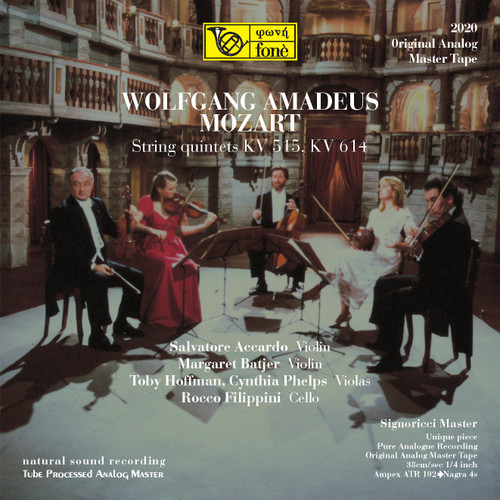TAPE 1
Concert for Violin and Orchestra No. 1 in B major, KV 207
Allegro moderato 7'44"
Adagio 9'33"
Presto 5'47"
Conceived, mastered, and produced by Giulio Cesare Ricci
Recorded at Villa Contarini, Piazzola sul Brenta (Padua)
Recording date February 20-21, 1990
The unique and almost extemporaneous importance of the violin concerto genre in Mozart's musical output is highlighted by the extremely limited time span in which the five most important compositions of this type appeared (all within the same year, 1775). It is not easy to understand the reason for this temporal constraint, especially considering that Mozart was one of the few great composers capable of perfecting the piano and violin; while his activity as a virtuoso pianist remained constant throughout his life, that of a concert violinist ended in a very short time. abrupt and inexplicable after having flourished so resoundingly in 1775. Perhaps only psychoanalysis will be able to shed light on this peculiar aspect of Mozart's creativity, starting from an investigation of the complex relationship the musician had with his father Leopold, an important violinist and theorist, author of a fundamental treatise (Versuch einer grundlichen Violinschule – published, coincidentally, in the very year Wolfgang was born). Yet the notion of an "inferiority complex" would seem to be contradicted by a famous letter from Leopold to his son: referring to Wolfgang's recent success as a concert violinist in Germany, Leopold writes: "It doesn't surprise me at all. You yourself do not realize how well you play the violin.” Mozart undoubtedly used the five violin concertos he composed in 1775 (KV 207, 211, 216, 218 and 219) for his solo activity in his hometown of Salzburg. Only later did these works become part of the repertoire of the violinist Gaetano Brunetti, who entered the court of Prince Colloredo as an official soloist. These concertos, which reflect the French galant style but also borrow from the great Italian violin tradition, contain some of Mozart's most beautiful and inspired melodies. The series opens with the short concerto in B flat major KV 207, completed on 14 April 1775; it is in this work that one can most clearly detect the nineteen-year-old Mozart's adherence to the style of the great Italian masters (Tartini, Geminiani, Nardini, Locatelli...) with whom he was familiar, both thanks to his father and through direct experience of their music during the travels he took. he had performed in Italy. This concerto appears rich in ideas but rather lacking in balance in its development and generally not particularly coherent in the overall architecture of its three movements. At Brunetti's request, Mozart replaced the elaborate Presto finale with a lighter Rondo completed a year later. The second Concerto, K. 211 in D major, was completed in June 1775 and is once again lacking in contrast and in no sense an innovative composition. The opening movement is an Allegro in which the soloist does nothing but respond courteously to the theme indicated by the orchestra. The central Andante is more graceful—in all these concertos, it is in the slow movement that the sweet, melodic voice of genius resonates—with a movement that might recall a delicate theatrical aria. The third movement, Rondo, reflects French taste but is nothing more than a pleasant, generic elaboration. Luca Chierici










